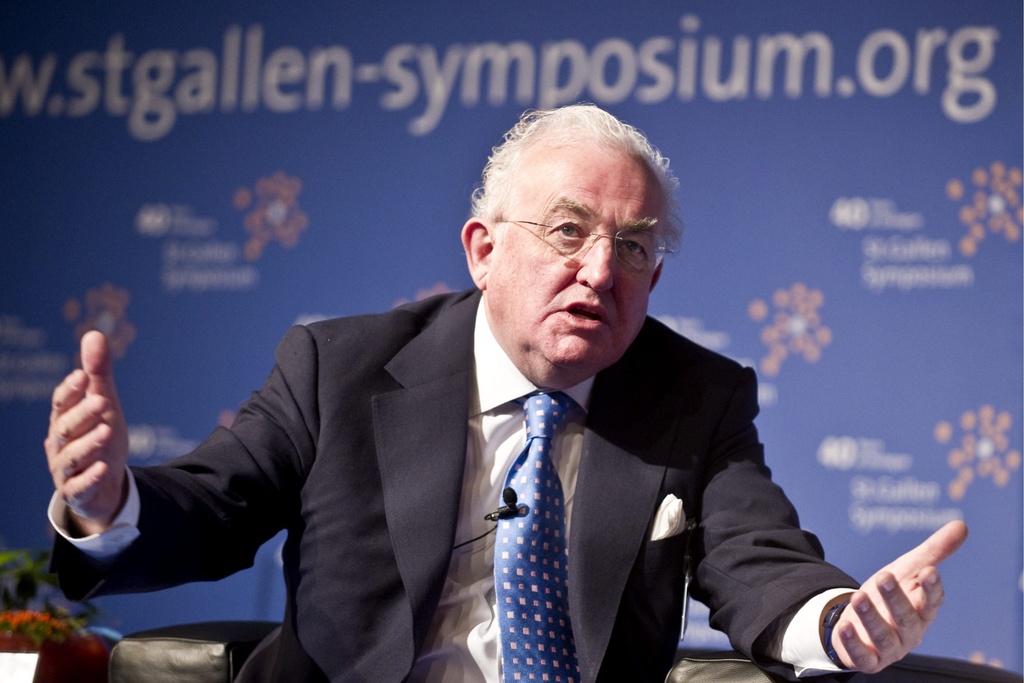
Student symposium spans two eras of unrest

Born out of the flames of the 1968 student riots, the St Gallen Symposium finds itself once again bringing together discordant voices during a period of turbulence.
The student-run forum, which has notched up its 40th year, is a vital ingredient in preventing the unrest in Greece from becoming a “contagion”, according to Symposium meeting chairman Lord Griffiths of Fforestfach.
Lord Griffiths was a 26-year-old lecturer when the London School of Economics was closed for several weeks in 1968. But he later moved into finance and has been a vice-chairman of under-fire bank Goldman Sachs International since 1990.
“It got very nasty, we had riots in the school. In Paris there were petrol bombs and burning cars in the Champs Elysées. There was almost a civil war element to it,” he told swissinfo.ch while recalling the events of that discordant summer.
“There was a huge generational divide between students and leadership. The St Gallen Symposium started because older people were not listening and the younger people felt they had no voice.”
Talk, not unrest
Five students at St Gallen University formed the International Students’ Committee in 1969, from which became the International Management Symposium a year later. The idea was to find a more constructive way of addressing problems.
The annual discussion platform between students and leaders from business, politics, academia, religion, science, media and culture later became known as the St Gallen Symposium.
The idea is as relevant today, in the wake of the financial crisis and subsequent global recession, as it was in 1968, says Griffiths.
“After the financial crisis people feel very angry and let down by the banks and it is a very serious social situation we face. You only have to look at what’s been happening in Greece recently with a bank set on fire and three people killed,” he told swissinfo.ch.
“The danger with Greece is one of contagion, and that’s why it’s extremely important that we have events like this. The message of the Symposium is that it is far better to talk than to throw bombs or set things on fire.”
Corporate influence?
Lord heavyweight of the financial world, Deutsche Bank chairman Josef Ackermann, is chairman of the St Gallen Foundation for International Studies that supervises the Students’ Committee and the Symposium.
The Symposium is also funded by the Circle of Benefactors, which includes UBS bank, the Swiss Re insurance giant and other multinational firms such as BMW and Microsoft.
But Philip Erzinger, chief executive of the Foundation for International Studies, denies that the Symposium has become over-run by corporate giants or is unduly influenced by financial leaders.
“No-one who sponsors the Symposium or gives advice attaches any conditions to their support,” he told swissinfo.ch.
“The students change every year so we have a 100 per cent attrition rate. The purpose of the foundation is to safeguard sponsors’ money and to provide continuity so that any contact we make one year will remember us in following years.”
Students choose participants and visit all of the invited speakers and suggest the theme of each year’s symposium.
In addition, Erzinger says students have been given greater powers this year by replacing many lectures with small workshop sessions. “This takes executives out of their comfort zone and allows students more space to challenge them,” Erzinger said.
Message of hope
The theme of this year’s symposium is: “Entrepreneurs – Agents of Change”.
“At the heart of wealth and job creations are small and medium-sized enterprises [SMEs], not the large corporations,” he said. “And at the heart of SMEs are entrepreneurs, people with ideas and vision, new products and services.”
“The students thought that the only way to find a long-lasting solution to the current economic mess is to have committed entrepreneurs.”
The choice of theme is also a message of hope, according to Erzinger. “The students wanted to show that something can be done. They wanted to hear voices who can get us out of this mess.”
Matthew Allen in St Gallen, swissinfo.ch
The idea was generated by five students at St Gallen University in 1969. They wanted a neutral platform to bridge the troublesome generation divide and to engage constructively with big business and politics at a time of great student unrest in Europe.
The five set up the International Students’ Committee that spawned the first International Management Symposium held in St Gallen in May 1970.
Around 100 representatives from the world of business and politics attended the Symposium along with the same number of students. The success of the meeting led to the resolution to make it an annual event.
The symposium is run by students at St Gallen University. In 1974, the St Gallen Foundation for International Studies was formed to oversee the organisation of the event together with a Circle of Benefactors to create permanent links with the business world.
Each year a team of around 25 students are picked to comprise the International Students’ Committee. The team takes a year’s break from their studies to dedicate their time to arranging the symposium meeting.
The 40th symposium, entitled: Entrepreneurs – Agents of Change, is taking place on May 6-7, 2010. Speakers include: Josef Ackermann, chairman of Deutsche Bank, Paul Bulcke, CEO of Nestlé and Harvard University professor Niall Ferguson.
Discussions centre on the role of innovation and entrepreneurs in dragging the world economy out of recession.

In compliance with the JTI standards
More: SWI swissinfo.ch certified by the Journalism Trust Initiative


























You can find an overview of ongoing debates with our journalists here . Please join us!
If you want to start a conversation about a topic raised in this article or want to report factual errors, email us at english@swissinfo.ch.